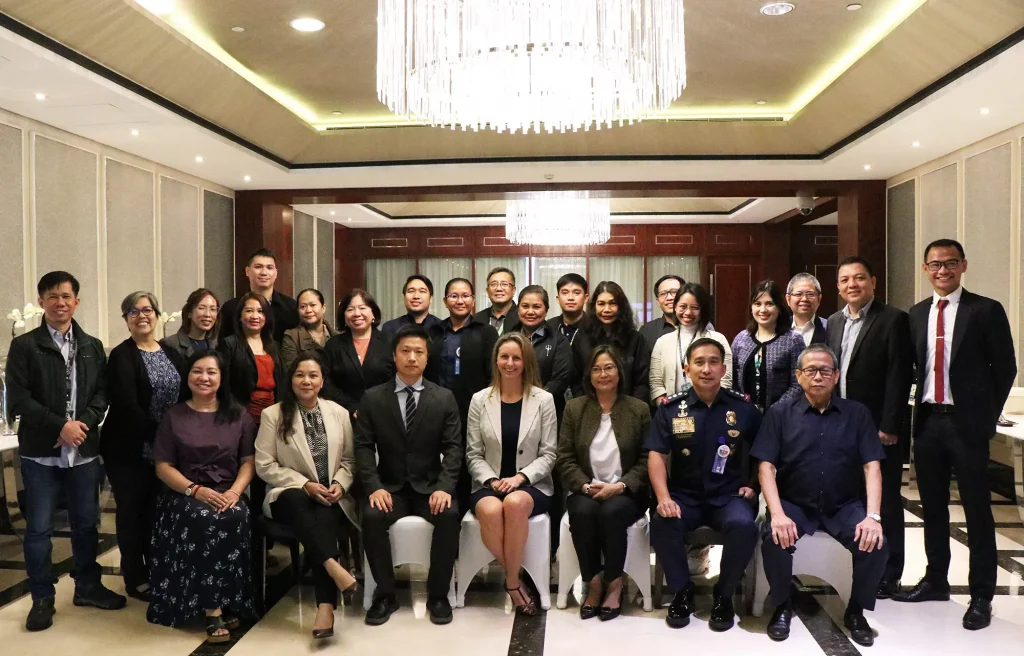
Makati City, Philippines – The Department of Environment and Natural Resources-Biodiversity Management Bureau (DENR-BMB) and the United Nations Office on Drugs and Crime (UNODC) jointly organized an event to present the comprehensive output of the inter-country collaboration, “The International Consortium on Combating Wildlife Crime (ICCWC) Wildlife and Forest Crime Analytic Toolkit Report on the Philippines” held on 18 January 2022 at the Makati Diamond Residences, Makati City.
More than 30 participants from the national and regional government agencies and non-government organizations attended the event. These included representatives from the DENR, Bureau of Fisheries and Aquatic Resources (BFAR), Philippine National Police-Maritime Group (PNP-MG), Bureau of Customs (BOC), Department of Justice (DOJ), Office of the Special Envoy on Transnational Crime (OSETC), Anti-Money Laundering Council (AMLC), Philippine Center on Transnational Crime (PCTC), Palawan Council for Sustainable Development (PCSD), Palawan Provincial Office, Environmental Legal Assistant Center (ELAC), USAID-SIBOL Project and Conservation International Philippines (CI-Philippines).
The UNODC and other partners of ICCWC through the financial assistance of International Narcotics and Law Enforcement Affairs (INL) of the United States Department of State developed two tools that will be used in conducting foundational national assessments, namely the Wildlife and Forest Crime Analytic Toolkit and accompanying Indicator Framework. These tools served as first step in understanding the preventive and criminal justice responses to illegal wildlife trade—an increasingly organized and sophisticated crime involving large numbers of wildlife led by syndicates within and outside the Philippines. The toolkit process was formally launched in the Philippines through a High-Level Meeting held last 23 May 2022, followed by an in-country, in-depth consultation conducted by the UNODC experts with the relevant stakeholders engaged in combating wildlife and forest crimes. This consultation served as the critical basis in the development of the ICCWC Wildlife and Forest Crimes Analytic Toolkit Report in the Philippines which was presented by the UNODC Environment Team during the event.
Ms. Jenna Dawson-Faber, Regional Coordinator of the UNODC Environment Team, provided a brief presentation on the scope, methodology and executive summary of the report. It was followed by the presentation of findings and recommendations in the Legal Framework Component by Legal Expert, Prof. Andreas Schloenhardt, Enforcement Component by Law Enforcement Expert, Mr. Salvatore Amato, and Judiciary and Prosecution Component by Legal Expert, Atty. Ronely Bisquerra-Sheen. Consequently, Mr. Tao Zhiqiang, Program Officer of the UNODC Environment Team, presented the proposed Toolkit Action Plan Activities which complements the existing Wildlife Law Enforcement Action Plan (WildLEAP).
Responses and recommendations were obtained from the participants specifically from the Bureau, DENR Regional Offices, PNP-MG, DOJ-National Prosecution Service and AMLC. They highlighted the identified strengths and major challenges relative to their respective agencies in terms of combating wildlife and forest crimes. They also provided insights to further advance the country’s strategies and approaches for a more strengthened collaborative effort towards effective wildlife law enforcement. Atty. Theresa Tenazas, Officer-In-Charge of the Wildlife Resources Division (WRD) of BMB remarked that the “Bureau is glad to note that the major findings and recommendations of the Toolkit Report were consistent and aligned to the general features of the proposed amendment of Wildlife Act such as inclusion of wildlife trafficking as a separate offense and consider wildlife crime as a transnational offense, to increase fines and penalties for wildlife violations and prohibited activities up to 20 years, insertion of offence for wildlife laundering, and inclusion of an offence criminalizing the unlawful introduction of invasive alien species (IAS), among others”. Likewise, Atty. Tenazas added that the “Bureau welcomed the recommendations of the ICCWC Analytic Toolkit Report which complement and support the WildLEAP. These recommendations will be integrated in the re-assessment of the existing action plan to ensure a comprehensive framework for prosecuting, investigating and penalizing wildlife crime”.
With these notable contributions, OIC Director Natividad Bernardino of DENR-BMB, extended her sincere gratitude to the UNODC for providing a comprehensive output that “will provide cognizance to the preventive and criminal justice systems’ response to wildlife and forest crimes in the country”. According to Director Bernardino, “the Bureau is very much pleased to have the full support of the international community, other law enforcement agencies, prosecution and partner’s stakeholders, who are critical and indispensable allies in fighting against the wildlife and forest crime chain.”
Ms. Dawson-Faber was inspired with the warm collaboration with the Philippine government and is hopeful for continued inter-country collaboration.
Partnership of DENR-BMB with UNODC
For almost four years, the partnership of DENR-BMB and UNODC provides various support and assistance in conducting capacity building activities such trainings, seminars and workshops for the law enforcement agencies, prosecution, and partner stakeholders as well as donation/turn-over of hardware and software, tablets and other equipment to improve our response in addressing the pressing issues in combatting illegal wildlife trade in the country. Additionally, the completion of the toolkit report with evidence-based recommendations will enhance the Wildlife Law Enforcement Action Plan (WildLEAP) — the country’s roadmap for a strengthened, sustained, and well-coordinated program on wildlife law enforcement.



